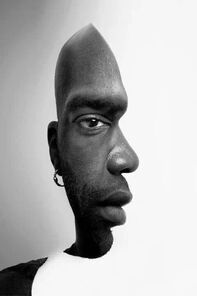|
Like it or not, you’ve been framed. You’ve framed others too. Not just some-one. Everyone you’ve ever met or imagined. Think: male, female, black, white, tall, short, extrovert, introvert, manager, staff, marketing, operations, rich, poor, educated, uneducated, leave, remain. Whatever category we apply to ourselves, or to others, creates an experience, an awareness, of same-as or different-to. ‘I’m a white, male, Christian from the North East of England. I like riding motorbikes.’ Notice what those descriptors evoke for you. Reflect on which draw you towards me and which push you away from me. Have those words created a sense of greater affinity with me or do they now make me feel more alien to you? How are they the same or different to the labels that you apply to yourself? Why does this matter? Well, the categories, the frames of reference, we use are always selective and simplifications of a wider reality and, thereby, reductionist. They draw our attention to certain attributes and cause us to not-notice others. They carry personal-cultural value judgements and trigger emotional responses that influence, often reinforce, our beliefs, attitudes and behaviour. So - what happens if we switch frames, re-frame? What then becomes possible? How can I help you reframe your reality and relationships? Get in touch! [email protected]
54 Comments
Well-being and resilience are hot topics in the world of work at the moment. The Stockdale Paradox offers a useful psychological outlook and stance. How do you handle faith, facts and hope? ‘Retain faith that you will prevail in the end, regardless of the difficulties and, at the same time, confront the most brutal facts of your current reality, whatever they may be.’ (Stockdale Paradox) Someone commented recently on my ‘relentless optimism that everything will work out in the end.’ They saw this as a principle that guides my decision making, drawing on my faith as a follower of Jesus. I was a bit taken aback, partly because I had read in Jim Collins’ book, Good to Great some years ago that optimism can lead to naïve passivity in the face of challenge. On further exploration, it became clear that they meant I appear un-phased by some situations that could leave other people shaking. It’s as if I am open to, look out for, the possibility in, the opportunity in, what is. Sometimes. This is quite different to a kind of positive thinking that says things like, ‘You can be whatever you want to be’, as if personal, cultural and contextual constraints don’t exist, or, ‘Don’t worry, you’ll be fine’ – when clearly you won’t be. Collins talks about the importance of confronting the brutal facts; that is, of actively seeking out and facing what could well look and feel like the opposite to how we would prefer things to be. In contrast to optimism or pessimism, it’s a kind of relentless realism. It demands honesty, courage, humility, and a hopeful outlook to avoid falling into paralysis or despair. Achieving this perspective, attitude and stance isn’t always as easy, however, as it may sound. Psychodynamically-speaking, leaders, teams and organisations often develop subconscious and highly-effective defence mechanisms that protect them from dealing with issues that could feel threatening or anxiety-provoking. As a consequence, it can mean that we see what we want to see, hear what we want to hear and filter everything else out – without even knowing it. This may create both risky blind spots (what we can’t see) and dangerous hot spots (what we avoid facing). To add to the complexity, according to Gestalt and social constructionist research, leaders, teams and organisations can become so focused-fixated on specific issues they consider most important that they inadvertently exclude wider perspectives or dimensions – again without realising it. This influences what they perceive as key, what they consider to be the brutal facts in relation to it, what they believe the options are and, therefore, what they decide to do in response to it. It’s as if the narratives we create function for us as as-if realities. How do you handle faith, facts and hope? How can I help you build well-being and resilience? Get in touch! I was reminded recently of one of my sister’s ex-boyfriends in our teenage years. The lad was called Tom and, one day, he decided proudly to have his name tattooed on his neck. When he got home, however, he was dismayed to look in the mirror and read ‘moT’. ‘I can’t believe they spelt my name wrong!’, he exclaimed in near despair. My mother looked on in near despair too. How could her daughter be going out with this guy?? My sister laughed but poor Tom just looked puzzled. I can hear so many satirical expressions immediately coming to mind: ‘Not the sharpest knife in the drawer; A few sandwiches short of a picnic; Proof that evolution can go in reverse’, etc. It’s as if we’re a lot brighter than Tom, less prone to such stupid mistakes. Tom misinterpreted what he saw but we see and understand things more clearly. Perception is reality and Tom needed a reality check. We’re not that easily tricked or confused. We’re not like Tom. We see things as they are. That is, until we read books like David McRaney’s ‘You Are Not So Smart’ (2012). With a wide range of disarmingly simple-yet-profound examples, McRaney describes a whole host of ways in which we unknowingly and convincingly delude ourselves, pretty much every day. Alex Boese concludes on the back cover: ‘Fascinating! You’ll never trust your brain again.’ It’s as if the assumptions we hold about what is real and true about ourselves, the world, life and relationships need to be held…lightly. Yet this poses some serious existential, ethical and practical challenges. Who or what are we to trust if we’re not sure what’s real or true? Who or what are we to take a stance on if we’re not sure if the ground we’re standing on is sound? Faith, doubt and belief come face-to-face with diverse related fields, e.g. social constructionism and Gestalt. This is rich territory for deep coaching, leadership and OD. So, tell me - what are your experiences of working with certainty and uncertainty, ambiguity and trust? I took part in a workshop last week that focused on social media, work and leadership. One of the questions that Zoe Amar, the trainer, posed was, ‘What’s your personal brand?’ It was in relation to being clear and authentic about, say, who we are, what makes us distinctive, what others value about us, what we have to offer etc. I quickly thought about my own Twitter, LinkedIn and website profiles. How clear and consistent am I in how I portray myself, what is true about me and what matters to me, bearing in mind the different audiences and purposes for those profiles?
The phrase ‘psychological coach’ sprang to mind. ‘I’m a psychological coach’. I also do mentoring, training, facilitation, consultancy, writing and even some teaching yet, somehow, ‘psychological coach’ felt the clearest and most grounding. Perhaps it’s something about how I see myself, what I enjoy, what expertise I hold, where I feel my calling lays, where clients say I add value, how I see and approach what I do. The psychological part signifies a type, a focus, a style, an orientation to my work' the coaching part signifies developing and releasing hope and potential in others. What this means in practice is that I tend to view and approach leadership, mentoring, training, facilitation, consultancy etc. through a psychological lens. I instinctively look at what enhances or inhibits people, teams, groups and organisations from psychological, existential and systemic perspectives. I draw on insights and practices from fields as diverse as social constructionism, Gestalt/field theory and cognitive behavioural psychology. I enable people, teams, groups and organisations to grow in insight and ability to create, achieve and sustain their transformation. So – ‘I’m a psychological coach’. Inspired by my Christian faith and informed by my studies and experience, it’s at the heart of who I am in the world, my work, what I do and how I do it. What’s your personal brand? This is a place where Gestalt and Social Constructionism meet. ‘Ge-what and what?’ Already confused? You could well be. I’ll have a go at explaining it. I discovered these words whilst studying organisational and coaching psychology. They arise out of a background, a field of research, experience and practice where psychology and philosophy dance together to create meaning. They have become words that I love, carrying all kinds of exciting insights, ideas and potential.
Yet my point is that they only hold meaning, evoke a response, against a backdrop. My experience and understanding could be very different to yours and that will influence what we each notice, what sense we make of it and how we feel when we encounter it. So, for instance, if you are feeling irritated now by my use of academic-sounding language, your focus is likely to be on me, on my words, rather than on the personal background and experiences that influence your reaction. Gestalt describes this phenomenon as ‘Figure’ – for argument’s sake, the thing we notice, that is holding our attention, in the moment, and ‘Ground’ – the background to the ‘Figure’ that we are not noticing. Similarly, Social Constructionism proposes that it’s the hidden subconscious backdrop of our beliefs, values, interests, experiences etc. that create meaning and make sense of that which we notice and focus on. And, for most of the time – the background is completely invisible to us. So here are some ideas: You’re leading a team and people get stuck, fixated on an issue. Why is it so important to them? Check out the invisible backdrop as a way of resolving it. You’re facilitating an organisation through change and things start to feel derailed. Surface underlying cultural constructs and assumptions to enable a shift. You’re coaching a client who presents an issue, a relationship, as if it exists in a vacuum. Explore the invisible context, the ‘what else’, to create a solution. ‘Reality is merely an illusion, albeit a very persistent one.’ – Albert Einstein
I saw a blog by Tony Clark on Heart of the Art this morning and found it so inspiring that I thought I'd share an extract here: Take a minute to scan your surroundings. Are you in a familiar place or somewhere new? Stop reading this, and just look around you. Pick out an object, maybe something you hadn’t noticed before, and focus your attention on it. If you really focus, it’ll get brighter and more “real” than it was when it was just an unnoticed piece of the background noise of your life. Now, try to view your surroundings from the point of the object. Some people can do this with no effort, and for others, it takes some concentration. Depending on how adept you are at focusing your concentration, you may notice a slight shift in your perception – a weird jump in realty, where you are suddenly viewing the world from a different perspective. What do you think..? Picture this. Here I am in a church meeting when a woman sitting in front of me starts to shake physically. This was in the context of a meeting where expectations were high that God would do something dramatic. The people around this woman prayed enthusiastically and the physical shakes were interpreted as a visible and positive sign of God’s activity.
I later spoke to a nurse and asked how the same phenomenon would be interpreted in, say, an Accident & Emergency unit at the local hospital. ‘Possibly as some kind of neurological disturbance’, she replied. I then asked how medical staff were likely to respond if they observed this happening. ‘They would probably conduct tests to understand and treat the underlying physical cause.’ This intrigued me. It’s as if the interpretation we apply to an experience depends partly on the socio-physical environment in which the phenomenon arises (in this example, a church or hospital) and what the prevailing expectations and interpretations are in that context. It also depends on our own personal belief systems and the broader cultural worldview that we inhabit. This raises interesting questions about which, if either, interpretation is ‘correct’. Someone of a particular religious conviction may argue strongly for a spiritual interpretation whereas someone of a secular-medical outlook may argue equally strongly for a medical interpretation. It sets up the risk of a false dichotomy, as if different interpretations are necessarily mutually exclusive. One way to look at this is that events and experiences have no inherent meaning of their own. They just are what they are. What happens simply…happens. As individuals and social groups (e.g. cultures, professions), we construct meaning based on what we believe and hold to be true. In other words, we apply meaning to events and experiences rather than derive meaning from them. A non-medical church member may look at the experience through a spiritual lens; a secular medical practitioner through a scientific lens. As a consequence, they each notice, don’t notice, include and conclude something different. Each lens creates and reinforces its own meaning, superimposes its own meaning, and, having done so, appears obvious or self-evident for those share that view. It seems possible to me that the same phenomenon can carry more than one meaning. In the example above, it’s possible (assuming, as I do, that God exists) that God may act in a person’s life by creating a neurological disturbance that may, say, reveal some hidden issue psychosomatically or symbolically that is important for that person or cultural community to pay attention to. Having said that, there may be different explanations altogether to those offered above that could explain this experience. They may not be obvious to us because they don’t fit with our current frames of reference or lenses and are, therefore, in effect, invisible to us. It’s a bit like asking a colour-blind person to describe coloured images or shapes on a card that lie outside their ability to perceive. So what is the significance for leadership, coaching and facilitation? I think it’s something about being aware, as far as we can be, of our own personal and cultural influences, the effect they have on, say, who and what we notice and don’t notice, who and what we value and don’t value and the impact we have on others. It’s about being willing to engage in the existential struggle that holding core assumptions lightly whilst taking a stance with conviction entails. It’s about using our work to help others – whether individuals, teams or organisations – grow in awareness of their personal and cultural beliefs, values and assumptions so they can explore new possibilities constructively and creatively. It’s about modelling and nurturing curiosity, integrity and hope. What is real, what is true, how can we know? These are questions that have vexed philosophers for centuries. In more recent times, we have seen an increasing convergence between philosophy and psychology in fields such as social constructionism and existential therapy. How we experience and make sense of being, meaning and purpose is inextricably linked to how we behave, what we choose and what stance we take in the world. As a Christian and psychological coach, I’m intrigued by how these fundamental issues, perspectives and actions intertwine with my beliefs, spirituality and practice. Descartes once wrote, ‘If you would be a real seeker after truth, you must at least once in your life doubt, as far as possible, all things.’ It’s as if we must be prepared to suspend all assumptions about ‘what is’, to explore all possibilities and dare to think the unthinkable in order to grow and make our best contribution. Things are not always as they at first appear. There are sometimes multiple explanations for the same phenomenon, depending on the frame of reference we or others use to interpret it (see, for instance, Gareth Morgan’s seminal work, Images of Organisation, 1986). We are sometimes blinded to what’s in front of us by our prejudices, preconceptions, cultural constraints or rigid views of the world. It can be hard to maintain healthy scepticism without cynicism. I see it with clients, sometimes in myself too. A sense of being trapped by a fixed Gestalt, a cognitive distortion, an inherited or learned belief system. An inability to see, to recognise the box that we’re in, never mind to see or think outside of it. An avoidance of deep, difficult questions because of the discomfort, confusion or anxiety they may evoke. If we’re not careful, if we can’t find the right help when we need it, it may limit our lives and our learning. I think this is where coaching can play a very important role, helping pose and address some deep questions. Nick Bolton commented insightfully in Coaching Today that, ‘To explore a coaching issue existentially is to understand the relationship that the presenting problem has to the human condition to which it is a response, and to remain focused on enabling a change of perspective that allows the client to move past their current challenge.’ He also provided some helpful examples: ‘For instance, how is a client’s procrastination around something that seems to matter to her a failure to remember that life comes to an end? How is a client’s need to be unconditionally loved by his partner an attempt to deal with existential rather than interpersonal isolation? (And the solutions are very different things). How is someone’s lethargy simply a part of their fear of taking responsibility for their life?’ (July 2013, p17) A metaphysical, existential or theological dimension can shift the entire paradigm of the coaching conversation. The question of whether a client should apply for this or that job is influenced by her sense of purpose. If she is willing to consider that God may exist and have a plan for her life, the whole situational context will change. It can be a dizzying and exciting experience, yet it’s really a question of how courageous and radical we and the client are prepared to be. How do we make sense of situations when it all goes wrong? How do we help clients do the same? I had one such incident this weekend. Having psyched myself up for a long cycle ride, the valve on my rear tyre broke just as I was setting off. I couldn’t fix it so I replaced it with a new tube. When I started to pump that up, however, the tube burst. I couldn’t believe it. End of ride. I felt surprised and frustrated. Why do these things happen? A couple of hours later, however, I felt relieved as the heavens opened with an unexpected downpour of cold rain. If I had made it out on the bike, I would have been caught out in the open, soaked to the skin with no waterproofs. Was this providential? Did the tyres mysteriously go wrong so that I would avoid this storm?
Alison Hardingham cites a Chinese Taoist story that fits the theme well. It describes a farmer in a poor country village. He was considered very well-to-do because he owned a horse that he used for ploughing, for riding around and for carrying things. One day his horse ran away. All his neighbours exclaimed how terrible this was, but the farmer simply said, ‘Maybe’. A few days later the horse returned and brought two wild horses with it. The neighbours all rejoiced at his good fortune, but the farmer just said, ‘Maybe’. The next day the farmer’s son tried to ride one of the wild horses. The horse threw him and broke the boy’s leg. The neighbours all offered their sympathy for this misfortune but the farmer again said, ‘Maybe’. The story continues. The next week, conscription officers came to the village to take young men away for the army. They rejected the farmer’s son because of his broken leg. When the neighbours told him how lucky he was, the farmer replied, 'Maybe’. (Psychology for Trainers, 1998, p116). The meaning of the story is clear. We are never quite sure of the future consequences of actions or experiences in the present. How we experience events, how we feel about them, is also influenced by how we frame them, how we construct them, what we believe about them. It’s the focus of a number of fields of research including cognitive behavioural psychology and social constructionism. In this same vein, I’m fascinated by an enigmatic place in the Bible where it describes the Spirit preventing people doing what they had set out to do and, presumably, were convinced was the right thing to do. (If you’re interested, check out Acts 16: 6-8). The point it conveys is that God may at times intervene in human lives to stop us doing something, e.g. if the unforeseen consequences may be harmful to us or others, or if there’s something else that’s more important for us to do. The Bible doesn’t attribute the direct intervention of God to every human experience. Nevertheless, for me, this example opens an intriguing window into a spiritual dimension that has important implications for how I make sense of what happens to and around me. Quite a while ago, I studied at a college. I really struggled with the whole thing and, since then, have felt a passion to support students going through similar experiences. Two years ago, the college sent out a flyer asking for coaches and mentors for its students. I felt delighted. This was my moment. I sent an email explaining my background and coaching experience and qualifications, including coaching and mentoring students from other colleges. No reply. I sent another email to the same person. No reply. Bemused, I sent an email to the college administrative team. No reply. Now feeling frustrated, I sent an email to the college registrar. No reply. Was this just a terrible system with poor client care, or was there a deeper principle at work? I’ve had other similar experiences. Some years ago I worked in a Palestinian hospital in the Middle East. The experience really screwed me up but, on return, I felt desperate to go back. I tried and tried, applying for job after job and yet every one drew a blank. I tried volunteering with various organisations and still drew a blank. However, in the back of my mind, in my spirit, I had this growing intuition, a 'spiritual discernment', that this wasn’t the right path for me. I don’t know what the consequences might have been if I had gone but this felt more than coincidence. So tell me. Have you had similar experiences where your or a client’s best efforts have failed? What sense have you made of it? What new insights or opportunities emerged as a result? ‘Live and let live’ sounds great until someone crosses the line or invades your borders. The man sitting next to me on the train this morning was an example, his feet spreading over into my foot space. I could feel myself tense up with irritation, ‘How could he be so annoying?’ In fact, I really dislike it when anyone crosses into my physical, psychological or emotional space uninvited.
It’s not that I’m an intensely private person. It’s something about protecting my freedom and control. I get stressed when someone plays their music or TV too loud, when kids kick the football against my house wall, when someone tries to manipulate or force me to do something. It’s as if these things feel like infringements on my freedom, my choices, my sense of autonomy. Khalil Gibran in The Prophet emphasises the value of space as essential for healthy human relationships. Psychologically, it’s about relating independently from a secure base in order to avoid unhealthy co-dependence or confluence. We could compare it recognising the necessary value of spaces between words and musical notes, enabling us to hear the lyrics and melody. In a work environment it could be about enabling space for people to express their own values, their own creativity, to innovate. It could be about ensuring people have their own desk space or time in their diaries to think. It could be about checking that roles and responsibilities are clearly defined and delineated to avoid confusion. It could be about avoiding risks of micromanagement. I’m reminded of a group dynamics workshop I co-facilitated with Brian Watts (www.karis.biz). Brian invited participants to stand opposite each other at a distance then slowly to walk towards each other until they felt they wanted to stop. It was fascinating to notice patterns in behaviour, how people felt as they moved towards, where they chose to stop in order to safeguard space. Typically in that group, women would stop at a greater distance to men than men would to women. In fact, a man would often continue walking towards a woman even after she had stopped, causing her to instinctively step back. Men stopped at a greater distance from other men and women stood closer to other women than they stood to men, or men stood to men. Personal space is also influenced by culture as well as gender and individual preference. Some cultures view such space as more important than others and people within cultures learn where to move, where to stop, where to place and uphold unspoken boundaries. It can create awkward tensions when people from different cultures navigate the spaces between them. My own spacial preferences reflect my personal disposition, my personality traits. The cultural dimension suggests that my ideas, experiences and feelings about space are socially constructed too. If I had grown up in a different cultural environment, I may well have learned to experience and negotiate space and boundaries very differently. Once conditioned, it’s hard to change. I guess the real challenge lies in how to enter and navigate space in a world where people with different values and preferences coexist and continually interact with each other physically or virtually, occupying the same or adjacent spaces. Perhaps it’s about how to create and safeguard the space we need without isolating ourselves, infringing on others’ boundaries or overriding others’ needs. What are your experiences of space? What are the anxieties and pressures that cause us to avoid or squeeze out space? How can we create space for ourselves and others in our lives, relationships and organisations? What are the psycho-social and spiritual costs of inadequate space? How do we balance space with pace? How can we learn to breathe? |
Nick WrightI'm a psychological coach, trainer and OD consultant. Curious to discover how can I help you? Get in touch! Like what you read? Simply enter your email address below to receive regular blog updates!
|








 RSS Feed
RSS Feed